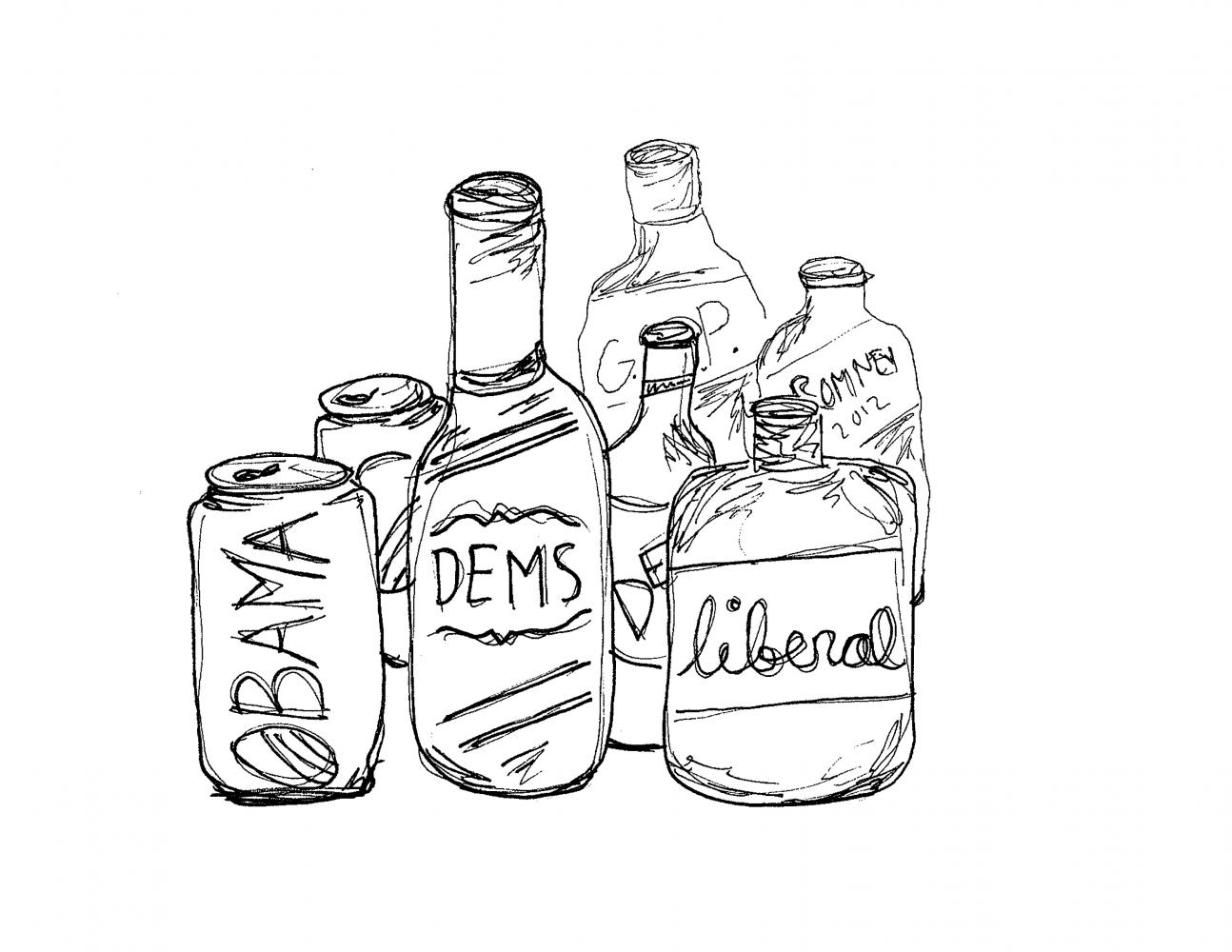Not a Dry Campus: Drunk on Liberalism
Now, I’m not complaining. Quotidian experience is functionally easier in an environment where everyone agrees. But just like flowing Keystone at a frat party, too much of one ideological opiate can distort our view of the world—and make us treat people differently than we would have otherwise.
***
I loaded my 12-gauge, donned my steel-toed boots and hunting gear, pocketed my little black bible and drove my Ford F-250 Super Duty into the bowels of campus conservatism to find the last remnants of an endangered species here at AU: establishment Republicans.
What I found was a batch of very reasonable people with whom I, a sometimes-idealistic, independent social liberal, don’t much disagree with. The Republicans I interviewed had social views in line with the goodwill that marks AU one of the best places to be a LGBT college student. They were, like myself, irked at the political polarization of not only our country, but of our campus.
And some of them offered that AU’s polarization has become so unbalanced toward the Democratic Party that it has become futile for conservative students to even try to engage in a conversation. I’ve seen something similar myself: after the State of the Union, I asked a Republican floor-mate what he thought of the speech.
“Let’s not even get into it,” he said.
Are we creating an environment so entrenched that the power of the liberal line has metastasized to a size large enough that it distorts our marketplace of democracy? Here’s what a few of AU’s proud conservative freshman think about the issues of the 2012 presidential race, and how they are seen on campus.
“We’re Fucked”
I found out that Carter Lowe was a conservative by word of mouth. He prefers the term “conservative” to “Republican,” both because of how Republicans are seen on campus and, “because it actually means something.” He’s outgoing, a theatre major and his gestures are those of a practiced actor. He was born and raised in South Carolina, and he dresses impeccably. In line at Subway, I ask him about the Republican candidates.
“We’re fucked,” he says, with a chuckle, only half-kidding.
“But if you had to pick one, based on who is left,” I ask as he orders a Black Forest Ham from Subway.“Who would it be?”
“Well,” Lowe says. “I’ve always been okay with Romney. It’s sorta like that kid in your hall who you’re acquaintances with, and, like, you don’t know them, but you think: they seem pretty cool, I guess.”
Lowe’s ambivalence is shared by a majority of conservatives. Despite his perceived inevitability, Romney’s numbers have not captured enough momentum to jump above 24 to 25 percent. And even though Iowa and New Hampshire turned perception to reality for a time, Newt Gingrich was able to quickly steal followers in South Carolina. Romney found himself in 2nd place for the nomination in major tracking polls at one point. But Lowe doesn’t share in the enthusiasm.
“Gingrich is slime and I hate him,” says Lowe. I laugh, not expecting such a reaction from a fellow southerner.
“He plays the system,” he elaborates. “And he manipulates people. I know everybody does that, but he just seems so evil when he does it.”
Some of this attitude seems to have permeated into Florida and Nevada, where Romney found himself able to resoundingly defeat Gingrich.
“Huntsman was intelligent,” says Lowe. “And Ron Paul”—he stops to chuckle— “he just seems so cute. He’s just a cute old man.”
“What do you think of his libertarianism?” I ask.
“I don’t agree with it at all,” says Lowe. “I’m averse to sticking. As intense as people have gotten about deregulation or regulation, I don’t think you should stick to one. I think there should be a flow, so, like: we’re screwed now, more regulation; and once we get better, less government interaction.”
Interestingly, that’s precisely what John Maynard Keynes argued. But Lowe still considers himself a conservative. He finds business experience a valuable asset in a presidential candidate.
“So what would the perfect Republican candidate look like?” I ask.
“He would be a moderate Republican. He would be able to compromise. But he would be able to get people to compromise with him as well.”
“And do you think Romney can be that? A moderate Republican?”
“Mhmm. His background in Massachusetts suggests that he would be able to deal with people. And his background in business…I know people get mad at him when he sticks his suit in his mouth,” Lowe says. Romney’s outstretched hand, cocky smile, and “ten-thousand-dollar bet, my friend,” come to mind before he continues. “But a business background is very good.”
I tell him governments function differently than Bain Capital or some other equity firm. They don’t pursue profit, but specific, electorate-defined responsibilities and general welfare.
“Why do you think a business background is good for making macroeconomic policy?” I ask.
“Well, first of all you have an understanding of it,” Lowe answers. “America is a lot of things, but one of the things it is, is a business. And when there are people taking advantage of the system, just like in a company, you have to sort that out.”
“So would you vote for Obama now over Romney?” I ask.
Lowe thinks for a second.
“I would really have to examine, if it comes down to—well, I hope it’s not Gingrich,” he says, sighing. “If it is Romney, I would really have to examine each issue singularly and see how much I think Obama could get done about it. Issues that matter to me, like education, for example, Obama saying you can’t teach to the test in the State of the Union. That’s huge. That is huge.”
He says that’s “a slap to the face of what No Child Left Behind has become,” a policy he vehemently opposes.
We talk about gay marriage. Lowe supports it. We discuss party divisions, evangelicalism and libertarianism. His father is a pastor, and he criticizes Reagan for the rise of the religious right.
“How religion has become so tied in politics is disgusting, and it’s a bastardization of everything Jesus said. And it all started—I mean, I love the guy—but it all started with Reagan,” he says.
And finally I ask Lowe how he feels as a Republican on campus.
“Do you feel ostracized at all?”
“Oh, no, no, no,” he says, crumpling up his Subway wrapper.
“I could see how someone like my roommate,” who is a much more emphatic Republican, “might feel ostracized. But I don’t feel ostracized at all. Maybe in the summer I’ll get more into it, especially if Romney is the nominee.”
“What about the general election would make it more exciting?” I ask.
“Well, I can’t wait to see who Romney’s vice-presidential candidate will be,” Lowe says.
That’s really what Lowe thinks is missing from the candidates right now. He thinks the bigger problem is that none of them are compelling.
“2008 was so—both the primaries were great. But once we got to the general election, and John McCain was the nominee…”
I anticipate where he’s going.
“If you really look with perspective at Sarah Palin, think how unique she was,” Lowe says. “She was like the Tim Tebow of politics.” At this point, I choke on some thinly sliced lettuce because I’m laughing so hard—“because she wasn’t that good, but she was so interesting.”
“But here’s the difference,” I say, barely able to keep a straight face. “Tim Tebow can actually play football.”
And from there we get into a debate about Tim Tebow’s mechanics. Lowe calls his throwing technique “an embarrassment to football” and the conversation ventures elsewhere, and those things that we share start to trump those on which we differ. As we berate the Broncos, I think to myself that I wish more political discussions were like the one I just had.
“The Republican Party is Falling Apart”
Morgan Tadych is the only person to respond to my Facebook post asking for Republican interviewees—and she does so enthusiastically. She has short hair and intelligent grey-blue eyes. She’s a proud member of Army ROTC and regularly attends College Republicans meetings. She’s originally from Wisconsin, where Governor Scott Walker recently took a machete to state spending and union rights. We start where I started with Lowe: the 2012 election.
Tadych notes the lackluster candidates. “The Republican party is falling apart,” she says before we’re even sitting down.
“I mean, I was a Pawlenty fan, but he dropped out last August.”
Pawlenty, a popular former Minnesota governor, dropped out while polling around seven percent. If he had waited some say he might be a front runner now. Santorum was polling at only three percent then and has gained enormous traction, winning the Iowa caucuses.
“So did Huntsman appeal to you?” I ask.
“I mean, Huntsman didn’t have the base that Pawlenty did because he just got back from China. So Pawlenty was a social moderate, and he had decent economic and foreign policy,” she says. “But then he dropped out, and then I didn’t really support anyone.”
She stops for a second.
“Well, I kinda supported Perry. But then he turned out to be a jackass,” she says.
“Do you think you supported him because the Republican establishment had big expectations for him?” I ask.
“Possibly. But I liked his foreign policy,” Tadych says.
“What do you think of Ron Paul?” I ask.
“I don’t support him because I’m in the Army. I’m not going to have a job when he’s president,” she says.
Ron Paul does put forth a legitimate argument, echoed by establishment Republicans when criticizing Obama, that spending is unsustainable. I wonder what a soldier-to-be thinks about cutting the military.
“We need to cut, but we can coordinate agencies, merge defense departments and make it more useful spending,” she responds.
A lot of what she’s saying falls in line with proposals the Obama administration has been making recently on the domestic front. For years now, the administration has been attempting to “streamline” the federal bureaucracy, by reducing the number of agencies.
We turn to foreign policy, and Tadych tells me she believes the Obama administration should be harder on Iran in terms of sanctions.
“Isn’t that what Obama’s been doing?” I ask.
“Obama’s had so much on his plate. So, I mean, Iran is like flash in the pan.”
I like the rhyme, but more interesting is how easily she brushes off the issue.
“You almost sound sympathetic to Obama.”
The idea is foreign to me. Republicans having empathy? Impossible. But my jaw hits the floor when she continues.
“Yeah, I kind of am. I kind of see where he’s coming from, but I guess he’s more a domestically focus president, and I’d like to see more of a foreign-focused president.”
I challenge her on this. We talk about Afghanistan and blowback and the dangers of occupation, and eventually she reveals she’s a disciple of George H.W. Bush. Interventions should be intense and over quickly. Get in, get off, get out, or don’t go in at all. I don’t disagree.
And then I ask her how she feels as a Republican on campus.
“[Republicans] are so marginalized on campus,” Tadych explains. “It’s sort of like, ‘you’re not one of us.’ There’s no legitimate dialogue, no ‘what do you think, and why do you think that?’” she says, genuinely frustrated, and I can see that she has a point.
“It’s ‘hey, did you hear about that douche-bag Perry?’ Just stuff like that,” she says. “It’s such a liberal environment that it’s hostile, almost.”
A liberal campus is a convenient campus. But no matter the ideology, ideological purity is not something to be desired. We have a tendency to become drunk with our own political creed, putting the success of our paradigm before progress, or worse, believing that our paradigm represents progress. So maybe it’s time we put down the democratic-party-line bottle and spend some more time trying to understand those who disagree with us.
To paraphrase Winston Churchill, in the morning, Republican policies might still be ugly, but at least we will have made that judgment sober.
Illustrations by Alissa Scheller.










